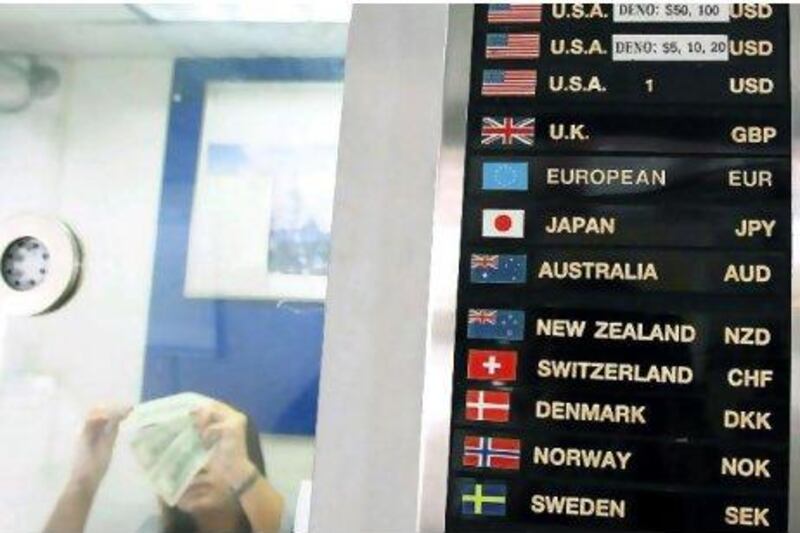Since the start of the global economic crisis, I have often been asked by people with disposable incomes - yes, there are still a few of them out there - not just what they should be investing in, but in what currency.
If I could gainfully answer those questions, I would likely write a book on good investment decision making and refer you to that.
Instead, what I can do is highlight the risk factors, specifically for currencies because of their relevance to the large expatriate population here. Precariously dangling over the following advice is the potential collapse of rolling commercial debt that could be brought about by increased interest rates. This macro event, like the Lehman Brothers collapse in September 2008, fundamentally alters the game. It is the sharp fall in the "L" of the "VL"-shaped recession I referred to in one of my columns last month.
Let us first take a look at the US. The government could only agree on a budget that lasts until next month, and this standoff between a Democrat executive and Republican legislature has ensured that another year passes without any serious attempt to tackle the country's ever-increasing deficit.
However, President Barack Obama is hoping to tackle this with his US$3.7 trillion (Dh13.5tn) budget proposal for 2012, which he presented to Congress this week.
The markets began to price in the likelihood of the budget standoff in July last year. However, the US market is also one of the world's most dynamic. Its ability to forgive and forget past digressions allows individuals to quickly re-enter the marketplace, thus driving recovery. Personal consumption rose 4.4 per cent in the fourth quarter of last year, with overall growth in the economy at 3.2 per cent.
US corporations tend to take a nationalist position when recession occurs, relocating operations from abroad and taking advantage of savings from a population happy just to have employment. The US has returned to the living, but it's still living beyond its means.
Across the Atlantic, the British pound has almost a mirror opposite situation. The coalition government has addressed astronomical overspending by its predecessor, cutting deep into public-sector largesse.
It has drawn inspiration from the successful Canadian experience in reducing its deficit, lowering spending by 20 per cent and doing without 25 per cent of its civil servants.
The fact that the UK borrowed £16.8 billion (Dh98.6bn) in December, 20 per cent below expectations, has given the market confidence. Coupled with increasing inflation, these developments are expected to lead to an increase in interest rates by the third quarter of this year. Although this action will hurt competitiveness somewhat, the sharp drop at the beginning of the crisis gave UK industry the time it needed to adjust. Manufacturing for last year, up to November, performed 4.4 per cent better than in the previous corresponding year.
UK consumers are a different matter; the adjustment from public to private-sector employment will be painful for many, although flexibility in employment expectations has been part of its economic make-up since the 1980s, giving it a favourable US tinge. GDP was -0.5 per cent in the fourth quarter of last year. While December's appalling weather conditions were a factor, just one more negative result and a double-dip recession is official.
The euro is the bungee rope of currency risk - you can't be sure at which end it might snap. Indeed, nerves of steel are required to stake a position in this spaghetti junction of eccentric economies. If Germany leaves the EU, the euro dives. If the PIIGS (Portugal, Ireland, Italy, Greece and Spain) leave, the euro rockets. If there is no change, the euro drifts, probably downwards.
But in truth, the endgame is nearly impossible to predict.
There is something reassuring about the Swiss franc. Like gold, it is a refuge for the uncertain. Monetarily sound, it has been economically moribund for a long time, growing at a boring average of 0.5 per cent per year for the past decade.
Meanwhile, the best value in both the Australian and Canadian dollars has probably already been seen. These commodity-driven economies are hostages to global consumption, with the overheating of manufacturing-driven emerging economies probably dampening demand towards the end of this year.
With regards to the yen, Japan has been two decades adrift, showing no sign of fixing its economic engine.
If you are an emerging market cheerleader, the BRIC (Brazil, Russia, India and China) currencies are all controlled to a lesser or complete extent, and most are overheating. China has just raised interest rates for the third time in four months.
India raised them in January for the seventh time in a year, while Brazil recently increased rates to 11.25 per cent. Even if you could buy these currencies, why would you do so now?
What I do advise - economically and unpatriotically - is to use your excess cash to pay down any debt in order of the rate of interest levied. If you have no debt, your position is enviable and your choices unenviable.
David Daly is the chief financial officer of The Sifco Group.





